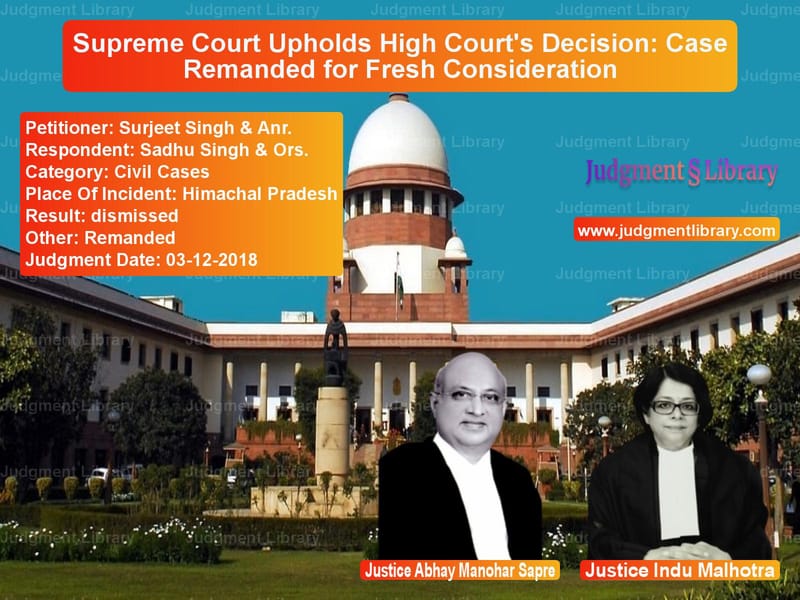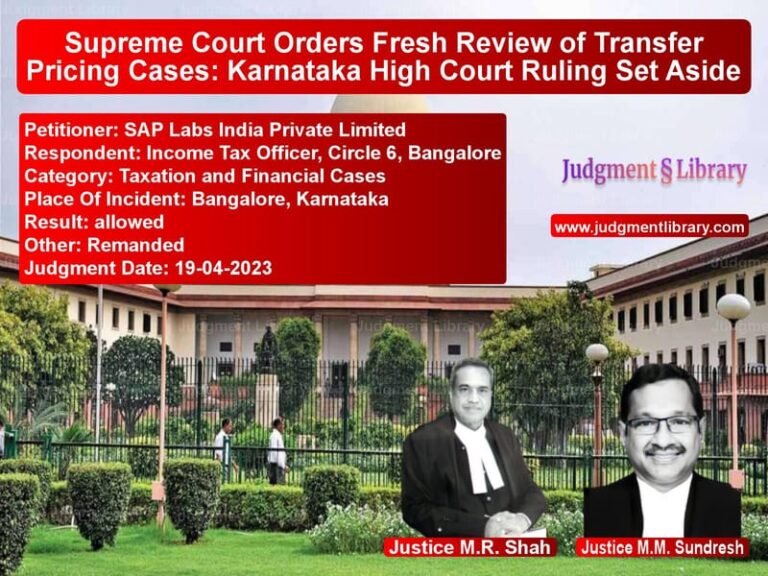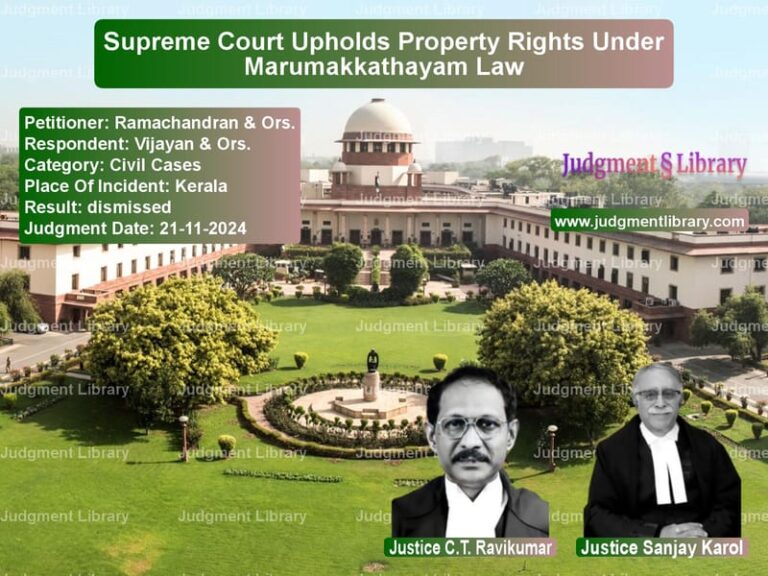Supreme Court Upholds High Court’s Decision: Case Remanded for Fresh Consideration
The case of Surjeet Singh & Anr. vs. Sadhu Singh & Ors. was an appeal filed before the Supreme Court of India challenging the judgment of the High Court of Himachal Pradesh. The appellants, Surjeet Singh and others, sought relief against the High Court’s order, which had remanded the case to the First Appellate Court for fresh consideration.
The fundamental legal question was whether the High Court was justified in remanding the case for reconsideration. The appellants argued that the High Court erred in its decision, whereas the respondents defended the ruling, stating that a fresh evaluation by the First Appellate Court was necessary.
Background of the Case
The dispute in question revolved around a civil litigation matter that had already gone through multiple levels of judicial scrutiny. The appellants had previously contested the decision of the lower courts, prompting the High Court to examine the case. Upon review, the High Court determined that the matter required fresh adjudication by the First Appellate Court. Consequently, it issued an order of remand.
Legal Issues and Arguments
The appellants contended that the High Court should have delivered a final judgment instead of sending the case back for a fresh hearing. Their primary arguments were:
- The lower court’s decision was well-reasoned and did not require further scrutiny.
- A remand would unnecessarily prolong the litigation, causing hardship to the appellants.
- The High Court overstepped its jurisdiction by ordering a fresh evaluation.
On the other hand, the respondents justified the High Court’s decision, stating:
- The First Appellate Court had not adequately considered all aspects of the case.
- A fresh review would ensure justice was served without procedural lapses.
- The High Court acted within its powers to remit cases when necessary.
Supreme Court’s Observations
The Supreme Court, comprising Justices Abhay Manohar Sapre and Indu Malhotra, carefully examined the matter. The court found no substantial reason to interfere with the High Court’s judgment. It observed:
“We find no good ground to interfere in the impugned order because we find that the High Court has only remanded the case to the First Appellate Court to decide the first appeal and cross-objection afresh on merits in accordance with law.”
The Supreme Court further noted that a remand order, in itself, does not determine the merits of the case but merely facilitates a more detailed examination of facts and legal arguments. The bench remarked:
“An order of remand, in our opinion, in the facts of this case, does not call for any interference. It is more so when in the opinion of the High Court, a case of remand was made out.”
Concerns About Lengthy High Court Judgment
While upholding the High Court’s decision, the Supreme Court made an observation regarding the length of the judgment. The High Court had issued a 60-page order explaining its decision. The Supreme Court found this excessive and unnecessary, stating:
“Before parting, we cannot resist observing that having rightly formed an opinion to remand the case to the First Appellate Court, there was no need for the High Court to devote 60 pages in writing the impugned order.”
The Supreme Court emphasized judicial economy and conciseness in writing judgments, adding:
“Brevity being a virtue, it must be observed as far as possible while expressing an opinion.”
Verdict: Appeals Dismissed
After thorough deliberation, the Supreme Court dismissed the appeals. It upheld the High Court’s decision and concluded that a remand was necessary to ensure that the case was decided on its merits. The bench stated:
“The appeals stand dismissed in limine.”
Conclusion
This judgment highlights the Supreme Court’s deference to procedural fairness in civil litigation. By allowing the case to be reconsidered by the First Appellate Court, the judiciary reaffirmed its commitment to ensuring justice through proper legal procedures. Additionally, the Supreme Court’s critique of the length of the High Court’s judgment serves as a reminder that judicial brevity enhances efficiency and clarity in legal proceedings.
Petitioner Name: Surjeet Singh & Anr..Respondent Name: Sadhu Singh & Ors..Judgment By: Justice Abhay Manohar Sapre, Justice Indu Malhotra.Place Of Incident: Himachal Pradesh.Judgment Date: 03-12-2018.
Don’t miss out on the full details! Download the complete judgment in PDF format below and gain valuable insights instantly!
Download Judgment: Surjeet Singh & Anr. vs Sadhu Singh & Ors. Supreme Court of India Judgment Dated 03-12-2018.pdf
Direct Downlaod Judgment: Direct downlaod this Judgment
See all petitions in Contract Disputes
See all petitions in Property Disputes
See all petitions in Specific Performance
See all petitions in Judgment by Abhay Manohar Sapre
See all petitions in Judgment by Indu Malhotra
See all petitions in dismissed
See all petitions in Remanded
See all petitions in supreme court of India judgments December 2018
See all petitions in 2018 judgments
See all posts in Civil Cases Category
See all allowed petitions in Civil Cases Category
See all Dismissed petitions in Civil Cases Category
See all partially allowed petitions in Civil Cases Category







